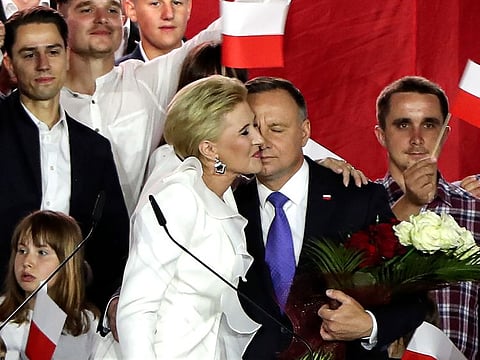Poland: Exit polls show knife-edge presidential vote
Incumbent Duda has slight edge, but result is too close to call

Warsaw: A knife-edge presidential run-off between the nationalist incumbent and his europhile rival plunged Poland into uncertainty Sunday, after an exit poll showed the result was too close to call.
President Andrzej Duda, a right-wing populist and close ally of US counterpart Donald Trump, scored 50.4 per cent in the poll by Ipsos whose margin of error was two percentage points.
Published just after polling stations closed at 9pm Polish time (11pm UAE), the poll put turnout at a very high 68.9 per cent, which suggests the final figure could end up being a record for the EU member.
Duda’s rival, liberal Warsaw mayor Rafal Trzaskowski, who has promised to heal ties with Brussels by rolling back a controversial reform of the judiciary, was shown just behind on 49.6 per cent.
“I’m happy with my victory, albeit an exit poll one for now,” Duda, who was flanked by his wife and daughter, told supporters waving red-and-white Polish flags while chanting “Long Live Poland!”.
Trzaskowski told his supporters: “The result has probably never been so close in Polish history, we’ve never felt the power in our vote so much.”
The result of the vote will be decisive for the governing Law and Justice (PiS) party, which is accused by critics of eroding hard-won democratic freedoms just three decades after the end of communist rule.
Duda’s support is strong in rural areas and small towns and the east of the country, while Trzaskowski has performed well in larger cities and western regions on the border with Germany.
“The result of these elections is a Poland divided in two with a not-so-rosy future, as it will be difficult to ease the division and to restore the relationship between the two sides,” analyst Kazimierz Kik told AFP.
Experts said the close result could lead to legal challenges.
Anna Materska-Sosnowka, a Warsaw University political scientist, said: “I think there will certainly be electoral protests and I think the whole issue will end up in the Supreme Court.”
Distanced queues
Wojciech, a 59-year-old builder who declined to give his surname, said he chose Duda because his close ties to Trump meant Poland “can count on the US for defence”.
But Warsaw pensioner Danuta Lutecka told AFP that “it’s important for there to be calm and good cooperation with our European partners”.
She said she had chosen Trzaskowski hoping for “less hate, less division” among Poles.
The election had been due to be held in May but was delayed because of the pandemic.
Duda’s support has slipped considerably since then, partly because of the virus fallout, which is pushing Poland into its first recession since communism fell.
The incumbent won round one on June 28 with 43.5 per cent against 10 challengers, including Trzaskowski who came second with 30.4 per cent and has campaigned hard to sway voters who backed other opposition candidates.
‘A clash of two visions’
Duda promises to defend highly popular social welfare payments introduced by the PiS government and has led a polarising campaign, attacking LGBT rights and ruling out certain Jewish wartime compensation claims.
Ahead of the vote, PiS Justice Minister Zbigniew Ziobro characterised it as “a clash of two visions of Poland, the white-red and rainbow-coloured,” referring to the colours of Poland’s national flag and the symbol most widely used by the LGBT community.
Trzawskowski supports allowing same-sex civil partnerships in Poland and his support for gay rights last year unleashed a protest by mostly southeastern regions which declared themselves “LGBT-free”.
“This election will determine Poland’s fate for the foreseeable future,” said Adam Strzembosz, a former Supreme Court chief justice and respected legal authority.
“Will it be dominated and completely subservient to a certain political party, with all the consequences of power that is dictatorial in nature? Or will we manage to stop this?”



